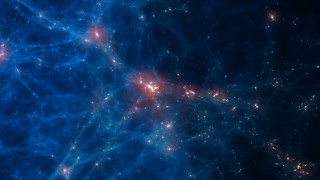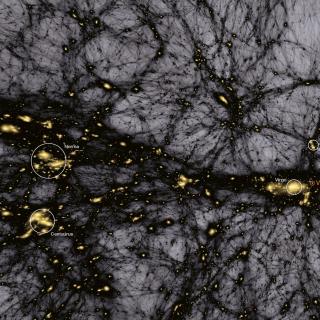Bibcode
Zackrisson, E.; Binggeli, Christian; Finlator, Kristian; Gnedin, Nickolay Y.; Paardekooper, Jan-Pieter; Shimizu, Ikkoh; Inoue, Akio K.; Jensen, Hannes; Micheva, Genoveva; Khochfar, Sadegh; Dalla Vecchia, C.
Referencia bibliográfica
The Astrophysical Journal, Volume 836, Issue 1, article id. 78, 12 pp. (2017).
Fecha de publicación:
2
2017
Revista
Número de citas
74
Número de citas referidas
64
Descripción
Using four different suites of cosmological simulations, we generate
synthetic spectra for galaxies with different Lyman-continuum escape
fractions (f esc) at redshifts z≈ 7–9, in the
rest-frame wavelength range relevant for the James Webb Space Telescope
(JWST) NIRSpec instrument. By investigating the effects of realistic
star formation histories and metallicity distributions on the
EW(Hβ)–β diagram (previously proposed as a tool for
identifying galaxies with very high f esc), we find that
neither of these effects are likely to jeopardize the identification of
galaxies with extreme Lyman-continuum leakage. Based on our models, we
expect that essentially all z≈ 7{--}9 galaxies that exhibit
rest-frame {EW}({{H}}β )≲ 30 Å to have
{f}{esc}> 0.5. Incorrect assumptions concerning the
ionizing fluxes of stellar populations or the dust properties of z> 6
galaxies can in principle bias the selection, but substantial model
deficiencies of this type should at the same time be evident from
offsets in the observed distribution of z> 6 galaxies in the
EW(Hβ)–β diagram compared to the simulated distribution.
Such offsets would thereby allow JWST/NIRSpec measurements of these
observables to serve as input for further model refinement.
Proyectos relacionados

Astrofísica Numérica: Formación y Evolución de Galaxias
Entre las cuestiones fundamentales en Astronomía y Astrofísica están la formación y evolución de galaxias. Las escalas de tiempo y tamaño son tan astronómicas que su observación en galaxias individuales es imposible. Solo con el uso de simulaciones numéricas es posible entender la formación de estructuras cósmicas dentro del actual marco
Claudio
Dalla Vecchia

Cosmología con Trazadores de la Estructura a Gran Escala del Universo
El Fondo Cósmico de Microondas (FCM) contiene la información estadística de las semillas primigenias que han dado lugar a la formación de todas las estructuras en el Universo. Su contrapartida natural en el Universo local es la distribución de las galaxias que surgen como resultado del crecimiento gravitatorio de aquellas fluctuaciones de densidad
FRANCISCO SHU
KITAURA JOYANES